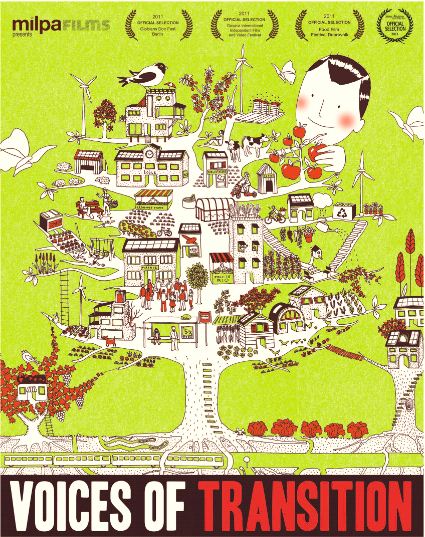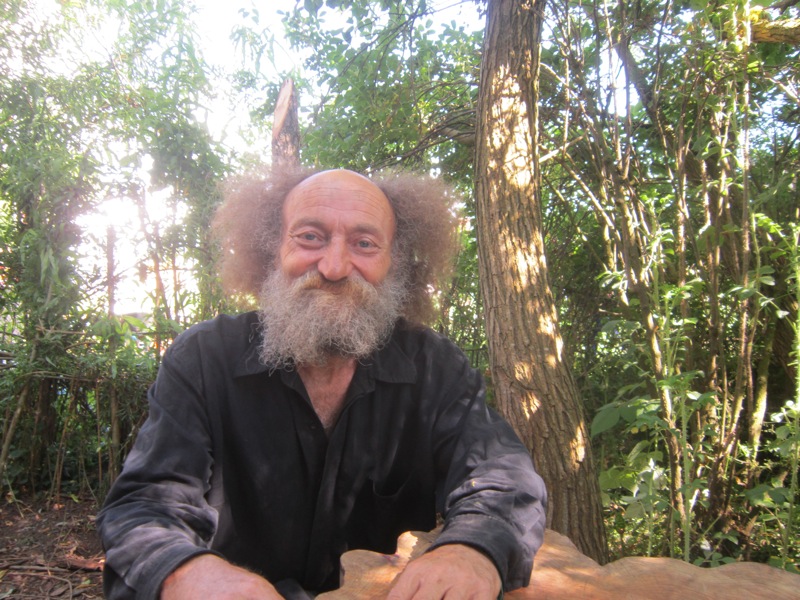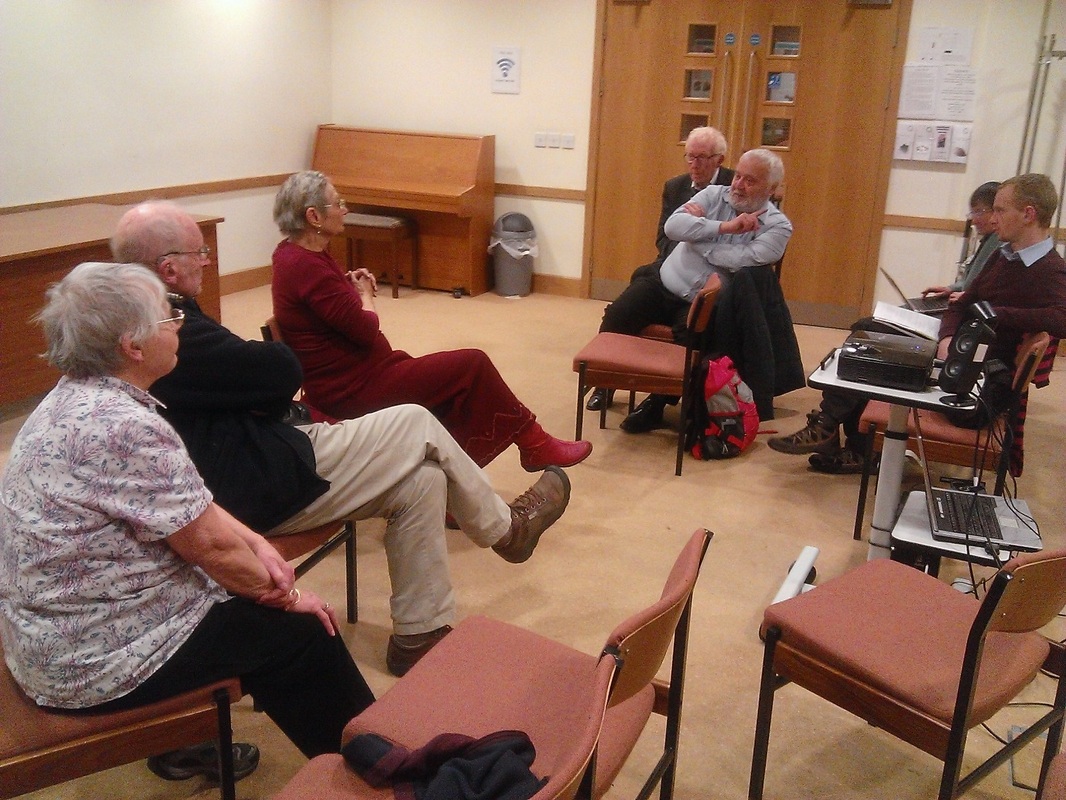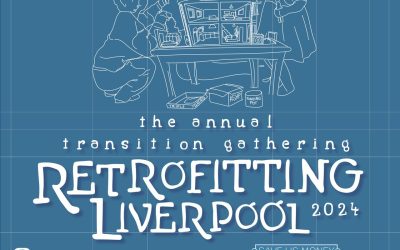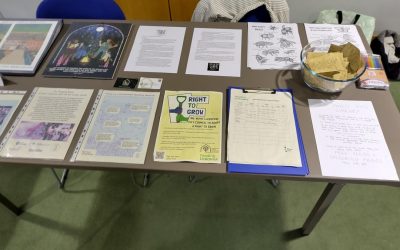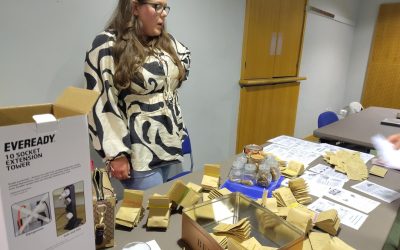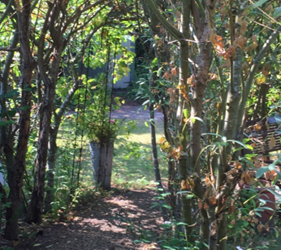Once our announcements were shared about key events and news of the sustainability movement in Liverpool we got comfy to watch the inspirational film “Voices of Transition”.
Rob Hopkins, co-founder of Transition Network, speaks about the positive benefits of learning new practical skills together and how it can enrich our lives. He also talks about the benefits of moving towards a local economy, showing examples including four people who have worked together to establish a local market economy around food production and the pleasure it has given them.
One of which, the Bristol based permaculture designer Mike Feingold, encouragingly shares his apple producing process. He focuses on the idea that nothing is wasted when he produces his pressed apple juice. If it’s left for a few days he said he can’t help it turning into cider. Then if the cider goes wrong he will obtain cider vinegar, and then the grade below that is a useful vinegar for cleaning. His infectious expression of bliss ignited us all with passion to go make our own.
The film also explored the benefits of local production as an important way of reducing food miles along with the nutritional value of establishing local box schemes which both provides cheaper food by bypassing the local supermarket and improving nutrition by providing it fresh, straight from the field.
The community allotment and many hands schemes are examples where local people work together taking it in turns to support each other. One positive by-product is that it promotes a community spirit. It also establishes a system that can help in strengthening us a little against future shock.
It touched on the political system including the WTO which undermines food sovereignty, to the detriment of poorer nations for example in Africa.
The final part looked at the way in which Cuba has managed to develop, its unique “post-industrial” farming system which exchanged large scale production methods and hi-tech equipment for low tech alternatives using local animals for fertiliser and a well-chosen selection of nourishing plants.
Adopting a local market garden model growing 80% of their food close to towns and based entirely on an organic model. Growing their own plants to act as natural insecticides and using the permaculture method of mixing their crops to maximise production. It also employs local people in both the production and preservation of food.
One of the blocks to promoting local food production in Liverpool is the political issue of who is responsible for auditing local land and establishing its use for the local production of food.
At a regional level, Merseyside and Greater Manchester are part of the same group and are expected to work together. There is no immediate driver, the price of oil being low. We need an alternative agenda based for example on the millennium goals and the WHO agenda.
There isn’t a scarcity of money but we need to think about how we engage people in local involvement in developing a local economy. We also need to bare in mind that local communities around Liverpool have very different values and priorities.
How do you get the message out and how do we engage local people? How can we help to make that connection and who can do this?
We need to talk to our neighbours and get to know people. Overcome our fears of connecting and begin to deepen our understanding of our own immediate communities.
What can we do to encourage Liverpool City Council to green its buildings, particularly now the people who were doing this have either been moved to other work or have gone. One way we could be more active is to make alliances with local city councillors.
We spoke about the agenda around meaningful work and how tending an allotment serves us and our communities well.
Happiness comes through helping others in our community. If we could give people status for meaningful work they do in communities, whether paid or unpaid, then everyone would gain.
We have huge waiting lists for the allotment sites and it is increasingly becoming a middle class movement. What can we do about this?
It is possible to eat off a plot all the year round by having cloches, having a greenhouse for salad greens and preserving food to survive the winter months.
Communities can get gather and organise together so that it attracts specialists.
It is impossible to set up a market without forming a charity and getting special permission. Pop up markets can be in empty shops. These things are being done. Squash Nutrition based in John Archer Hall have a milk float and grow produce in L8. They teach people how to cook and talk to people on the street.
We could suggest that the allotment movement which helped us survive the war, could be more visible and do things such as setting up a stall in local community events.
Some Merseyrail stations grow food in raised beds on their platforms where people can pick fresh food.
We need to communicate with people in a way that changes the local culture by having conversations with people on the street.
Putting pressure on government to
- enlarge the available allotment plots to reduce waiting list.
- Make sure there is an even spread of allotments to allow local access.
- Merge the health and food agenda
- Look at Manchester which has a well worked out agenda, eg Steady State.
We can underline the link between the the benefits of developing local growing projects and the 5 ways to health agenda.
We need to think about food in terms of the amount of oil it takes to grow food, in travel, fertiliser and water depletion.
We could have a stand at the Liverpool food festival giving out leaflets about local food outlets and allotments and providing local food to start the process of educating local people.
How are the local sewage farms connected with providing nutrients for food production locally?
Manchester has academics researching climate change and the associated problems underpinning climate change. How can find out what’s happening in Liverpool and develop a stronger more unified movement?
Locally there is Farm Urban doing aquaponics work. There is also Urban Ag (Greater Liverpool Food Alliance) doing aquaponics training locally. They have a limited budget but they are showing that there are positive things that can be done locally.
The website “Gather Liverpool” a product of the work of Liverpool Green Partnership. The website acts as an umbrella for all sustainability news in Liverpool.
We need to celebrate the local ecology and improve the way we share information in Liverpool.
Lancaster University has Internationally recognised Masters programmes including “The Circular Economy”.
L8LS has a helpful website that is a resource showing available space that can be used for growing food.
One suggestion for supporting local food outlets to make headway, is to support the ethnic superstores which undercut prices of other food outlets.
WEA permaculture courses coming up this Spring
Our focused actions
- We could upload our news onto Gather Liverpool
- We could put on an event to illustrate the health and nutritional benefits of growing local food
- We could use Bay TV, our free local TV station. They might film our local events. We could invite them if we make soups or stews for farmers markets
- We could try to with engage the allotment movement to promote the benefits of local growing initiatives and sharing excess produce
- We could set up a new transition food group
Next Months Event
Next months meeting will be sharing stories of transition where people will be encouraged to write no more than 360 words of their little stories of adapting to a more low carbon way of living.
Rather not wait til then, check out the Little Stories project here
We meet the second Wednesday of each month at Quaker Meeting House on School Lane L1 from 6.30pm.


